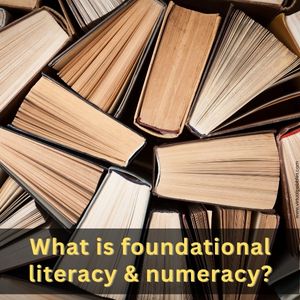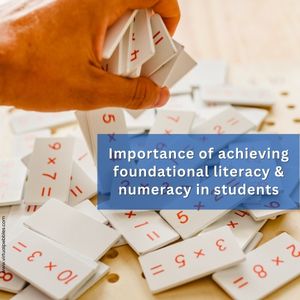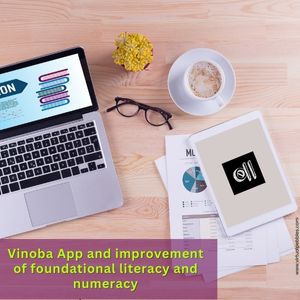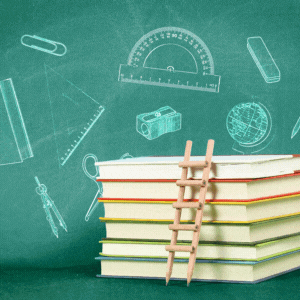What is Foundational Literacy & Numeracy?
Literacy and numeracy abilities are the cornerstones of lifelong learning and full involvement in society. These abilities enable pupils to attain their full potential, think critically and creatively, and create meaning. Literacy and numeracy are used in all subject areas throughout the grades. According to the Ministry of Education, literacy is the capacity to comprehend, evaluate critically, and produce a range of communication, including oral, written, visual, digital, and multimedia, to achieve one's objectives. Students can apply their reading, writing, speaking, and listening abilities in a variety of topic areas with the aid of literacy. The definition of numeracy is "the capacity to comprehend and use mathematical concepts, procedures, and abilities to solve problems and reach judgements in a variety of contexts, including real-life scenarios."
The accession of foundational literacy and numeracy (FLN) for all children is prioritised as an "urgent national priority" in the National Education Policy (NEP) 2020. The National Initiative for Proficiency in Reading with Understanding and Numeracy (NIPUN-Bharat) initiative of the Ministry of Education set forth further recommendations for this in 2021. Although the project is an objectively sound change, certain questions require to be raised about how it was framed and implemented. Math and reading comprehension abilities are crucial. But framing learning as limited to mastering fragmented reading and math skills results in a lack of awareness of and creativity for other holistic aspects of learning.

Importance of Achieving Foundational Literacy and Numeracy in Students

Early reading and numeracy abilities are crucial for learning because they not only provide the groundwork for future academic success but also for a person's quality of life, well-being, and economic prosperity. Children with strong literacy and numeracy skills are better able to learn, explore, reason, and create and participate in society on a social, cultural, and economic level. A lack of learning chances hinders children's academic growth and motivation during the early stages of learning reading and numeracy, which furthers their lack of performance.
Therefore, the goal of teaching children fundamental literacy and numeracy is to help them develop into independent, enthusiastic readers and writers who can move to "reading to learn" from "learning to read" and from "learning to write" to "writing for academic achievement and pleasure." Children show that they understand numbers and are familiar with mathematical notions. They also connect similar ideas and gradually apply what they have learned in new and unrelated circumstances. Understanding the current state of reading and writing among youngsters in the nation is crucial for realising the objective. According to numerous national studies, there is a learning crisis among the youth.
Pune Zilla Parishad's Efforts to Help Students
The Education department of Pune Zilla Parishad has prepared an implementation plan for attaining universal foundational literacy and numeracy in all 3,639 primary schools and over 160,000 students – from classes 1-5. This is an 8-week plan. There are three parts to the plan.
(a) In Stage 1 – At the start of the program – a baseline survey of all students, across std 1-5, is done where the students have been divided into groups based on their learning levels in Language and Maths. There are three learning levels identified in maths and language each.
(b) Stage 2 – is an 8-week program. For each week for each of the learning levels for Maths and language – (i) there is a clear learning outcome and (ii) day-by-day activities are given which are aligned to the learning outcome for the week, and (iii) at the end of the week – there is an assessment made if the students have achieved the objective for the week.
(c) In Stage 3 – an end-line survey is done.
The program is being executed systematically with a data-driven approach. The data for this program is systematically collected at each stage.

This systematic and data-driven approach helps to ensure that the objectives of the program and methodology are uniformly understood. This is especially important – in a large ZP organisation with over 3,600 schools spread over a wide locality. This approach helps keep the large group focussed on the same objective. This approach will help significantly improve the FLN outcomes of the students at the end of 8 weeks.
Vinoba App and Improvement of Foundational Literacy and Numeracy

The Vinoba app offers resources and community building for teacher support, teacher engagement, and teacher motivation in an effort to raise educational standards. Reducing the amount of data collecting labour teachers must do by using better templates and reporting is one of the factors. Additionally, it makes it easier for blockheads and cluster leaders to obtain high-quality data with minimal effort. Each teacher will reportedly save roughly 10 hours a month as a result of this adoption. The regular documentation of school activities and procedures aids in building a portfolio for the students, teachers, and institution as a whole.

